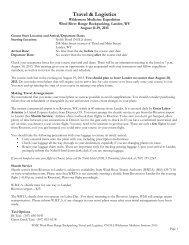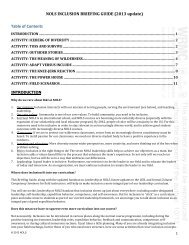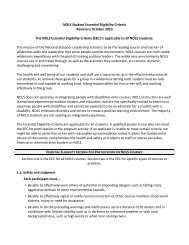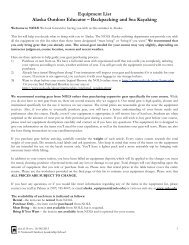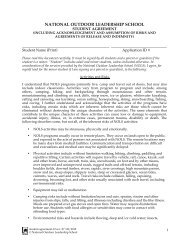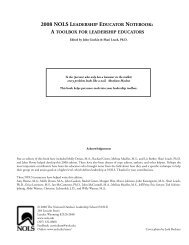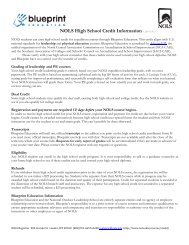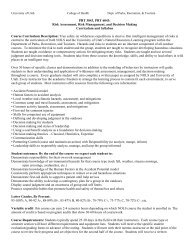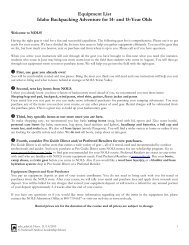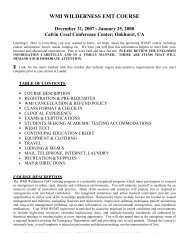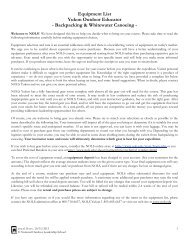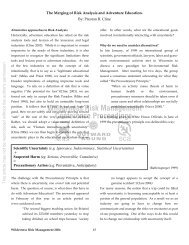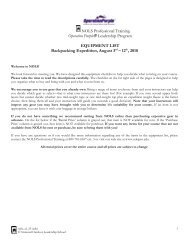Wilderness Medicine Training Center Effective Outdoor ... - NOLS
Wilderness Medicine Training Center Effective Outdoor ... - NOLS
Wilderness Medicine Training Center Effective Outdoor ... - NOLS
You also want an ePaper? Increase the reach of your titles
YUMPU automatically turns print PDFs into web optimized ePapers that Google loves.
the<strong>Wilderness</strong> <strong>Medicine</strong><strong>Training</strong> <strong>Center</strong><strong>Effective</strong> <strong>Outdoor</strong> Program Design& Management WorkshopGeneral InformationDesigning and managing an outdoor program is challenging. This is especially true intoday’s economy where fiscal responsibility is paramount to survival. Aligning your program’smission with the mission of your parent organization ties your reasons for existenceto those of your organizations making it less susceptible to devastating budget cuts. Operationally,an effective mission acts as a touchstone for all programmatic decisions; andfurther, it enables aligned critical and creative thinking that saves both time and moneywithout a loss of new ideas.While the term “safe” has many interpretations depending upon the lens—legal, participant,victim, staff, industry, culture, etc.—from which it is viewed, it is still commonlyused by the media and the general public to describe an activity or program. <strong>Outdoor</strong> programsafety, typically an important component of most mission statements, depends onthe ability of the program’s administration to balance the risk inherent in each trip designwith the competency of its field staff. There are three essential skill sets (outdoor, human,& educational) that must be taken into account when assessing the competency of fieldstaff and a fourth (an administrative skill set) for administrative positions. Possessing theappropriate skill sets in and of themselves does not ensure operational effectiveness however,there must also be an organizing construct that allows staff to link the concepts andskills represented by each set into a cohesive whole. To be effective an educational modelused to design and manage field activities and trips must be both flexible and practical.The key to efficient management is communication and the key to effective communicationwithin any industry is a systemic operational language and consistent structure. Operationallanguage permits rapid and efficient communication with little room for error. A consistentand systemic structure permits trained staff to focus on their jobs. Our two day workshopexamines the complex relationships surrounding outdoor program design & managementfrom both the field instructor and program administration perspectives using digital presentations,interactive whiteboard lecture, video, and small group activities. The overarchinggoal of the workshop is to introduce a comprehensive outdoor program design and managementsystem using clear operational language and concepts. The workshop is guaranteedto have an positive impact on how you administer and deliver your outdoor trips. Tuition
includes <strong>Effective</strong> <strong>Outdoor</strong> Program Design & Management, Second Edition (text) and workshopsmall group exercise book (sent via email as pdf file prior to conference). See quotesfrom past participants at the end of this letter.This workshop is for you if:• You are currently training field staff for your program’s outdoor trips or outings.• You have trained field staff in the past and are currently administrating an outdoorprogram at your school or organization.• You are looking to start an outdoor orientation, education, or recreation program at aK-12 school, college, university, camp, or other organization.• Your are currently responsible for designing (or redesigning) an outdoor program.You will get the most out of the workshop if:• You attend the workshop with a coworker. You will have the opportunity to discuss andplan aspects of your program during the workshop. Participants who have attendedthe workshop in the past with a coworker, report significantly added value.• You have mastery of at least one technical outdoor activity (paddling, climbing, skiing,biking, etc.). It’s not the activity that matters but the experience you have gainedlearning and teaching the activity.During the workshop you will learn:• How to design and manage a comprehensive outdoor program using a systemic modelwith clear operational language and concepts.• How to write and align your outdoor program’s mission with the mission of your parentorganization.• The importance of and how to design and diagram the structure of a trip and set realisticoutcomes and site progressions for each activity and activity block.• The basic structural components of field-based activities and understand their function.• How to design skill based initiatives.• The importance of site management theory and the basic structure of a generic sitemanagement training. Note that land and water-based site management skills cannotbe taught in a classroom.• An educational model for designing and managing activities in the field and how toadopt a similar model to meet your administrative needs.• Understand the components of the instructor and administrative skill sets and how touse them to set appropriate hiring, promotional, and training standards for your programand trips.• Understand the importance of accurate assessments and reporting in balancing thecompetency of your instructional staff with the inherent risk associated with your program/tripdesign.Desired outcomes for the workshop:• Introduce a comprehensive outdoor program design & management system using theOutcome Model.• Introduce site management theory & concepts.• Understand how to design and manage a program using the administrative lens of theOutcome Model.• Understand how to design and manage an activity progression using the field lens ofthe Outcome Model.
• Teach how to graph/draw the structure of a course or program in a manner that easilyshows skills progressions in order to facilitate discussion and planning.• Understand the components of a staff training & development system.• Introduce an incident analysis process consistent with the Outcome Model.• Introduce a program evaluation process consistent with the Outcome Model.• Understand the components of, how to design, and how to deliver an effective activityspecific site management workshop.With the goal as:• Decreased incidents• Increased program qualityUpon registration—or prior to the start of the workshop—you will receive a pdf file workbook.While not required it’s to your benefit to read through the workbook and completethe assigned “homework”. Please make sure that your email permissions include mail fromwildmedcenter.com.Workshop SyllabusThe following syllabus acts as a progression guideline. The speed of the progression willvary according to participants needs and some elements may be dropped. The workshopsstarts promptly at 8 AM and ends between 5-5:30 PM with one hour for lunch.Day 1General IntroductionDefining <strong>Outdoor</strong> Program Success• Program Safety• Fiscal Budgeting & the Incident Prevention/Incident Response Cycle• Educational Success• Program QualityIntroduction to the Outcome Model• Introduction: WHY?• the Outcome Model: its Basic Structure• SMALL GROUP EXERCISE: Core Principles & Strategiesthe Outcome Model: Looking through the Field Lensthe Design Cycle• Detailed Structure of an Activity• Basic <strong>Outdoor</strong> Education Strategies• Managing Hazards: Your Site Management Plan (includes Video examples)• Assessing Activity Risk in the Field• Common Field Errors• Small Group Exercise: Initial Assessmentthe Management Cycle• Managing Activities: Framing, Intervention, & Closurethe Outcome Model: Looking through the Field Lens Review• SMALL GROUP EXERCISE: Incident Analysis
Day 2the Outcome Model: Looking through the Administrative Lensthe Design Cycle• Designing & Drawing Block Outcomes & Progressions• Assessment & Progression: the First Activity...• Managing Risk through Program Design• Setting Staff Hiring & Promotional Criteria: Instructor & Administrative Skill Sets• Staff Competency• Developing Course Area Maps, Site Maps, & Activity Menus• SMALL GROUP EXERCISE: Block Progressions & Staffing• SMALL GROUP EXERCISE: Designing Field Initiativesthe Management Cycle• Ensuring Accurate Staff Assessment• Balancing Program Design & Staff Competency• Assessing Program Risk in 2-Person Instructor Teams• SMALL GROUP EXERCISE: Instructor Competency• Course & Incident Reporting• Staff <strong>Training</strong> & Development & the Components of an <strong>Effective</strong> Site Management<strong>Training</strong>• SMALL GROUP EXERCISE: Staff Development System• Evaluating Programs, Activities, & Incidents• SMALL GROUP EXERCISE: Incident AnalysisCourse Closure• Written EvaluationsThe following quotes are from past participants in the <strong>Wilderness</strong> <strong>Medicine</strong> <strong>Training</strong><strong>Center</strong>’s <strong>Effective</strong> <strong>Outdoor</strong> Design & Management Workshop. Plan on attending this yearto improve the safety of your program.______________________________________WMTC’s <strong>Effective</strong> <strong>Outdoor</strong> Program Design & Management workshop and Site Managementfield training provides a seamless model for effective decision making in the outdoors.It has become the centerpiece of our leader training program by providing a frameworkfor our student leaders to make and articulate their decisions. Our less experienced leadersin particular have grasped the concepts presented and are using them to understandquality decision making and rapidly improve their competence. It has also been useful asa training tool for determining where mistakes have been made in case studies as well asour actual trips.Bruce SaxmanDirector of Involvement, Leadership, & Adventure ProgrammingGreen Mountain College______________________________________
______________________________________I have found WMTC’s <strong>Effective</strong> <strong>Outdoor</strong> Program Design & Management and Site Managementmethodology and trainings to be the most useful training for outdoor educatorsavailable as it relates to managing participant’s safety and education in a wilderness environment.I strongly recommend wilderness educators take these trainings as ongoingprofessional development to ensure more effective safety and risk management. I firmlybelieve organizations that work with adolescents are amiss if they are not following thesepractices and certifying their instructors in the process.Doug Mahonex-Director of Operations for Pacific Crest Outward Bound Schoolex-Rocky Mountain Region Program Director Outward Bound <strong>Wilderness</strong>______________________________________The workshop was well taught and helped me to visualize the Outcome Model as it relatesto site management and apply it to my program. It was very helpful in designingeducation progressions and in learning field management of groups in technical terrain.Paul and Mat both have a wealth of knowledge in program design and risk management,and inspired me to make some changes to my program.”Mark Mullert<strong>Wilderness</strong> Services Coordinator/Rock Climbing SpecialistDiakon <strong>Wilderness</strong> <strong>Center</strong>______________________________________The <strong>Effective</strong> <strong>Outdoor</strong> Program Design & Management workshop helped my supervisorsunderstand how critical it is to integrate local site management and hazard assessmentwith their practices as regional program administrators. They now have a commonlanguage from which to build an effective risk management system, which is critical ina program that operates in 8 different regions of the country and is growing every year.Over the past two years we have eliminated all major incidents and reduced all incidentsby greater than 50%.Rebecca BearREI <strong>Outdoor</strong> School Manager_____________________________________
______________________________________I took my first site management training in 1997 on the Lochsa River in Idaho. It openedmy eyes to a whole new world of outdoor education. After having gone through this training,I find it hard to believe that an outdoor program would let anyone take students intothe field without it; its quality is hard to express on paper. The training is top notch andany program who uses it is getting a more qualified instructor because of it.Ten years later as a program director I know that staff who have taken this training aregoing to run incredibly safer, more effective and better educational courses than thosewho have not. In my opinion this training is a must for all outdoor professionals.Michael Armstrong<strong>Wilderness</strong> Program DirectorNorthwest Outward Bound School______________________________________As a program manager and training director, I’ve found the <strong>Effective</strong> <strong>Outdoor</strong> ProgramDesign & Management workshop and subsequent Site Management field training givesprogram administrators the tools they need to design and run a operating system for theirprogram. It offers staff a effective decision making process that takes into account the numerouscomponents required to design and manage safe activities. While in use at PCOBSwe saw an increase in enrollment, an increase in student satisfaction, and a decrease inincidents. It is also and by far the most cost effective way to run a safe high quality programavailable today.Michael Spilotrosex-<strong>Training</strong> DirectorPacific Crest Outward Bound School_____________________________________The thing that amazed me the most about going through the <strong>Effective</strong> <strong>Outdoor</strong> ProgramDesign & Management workshop is finding out that group handling techniques are notnecessarily common sense for outdoor professionals. Your workshop gives professionalthe tools to effectively deal with groups as well as ways to give instructions to new staffwhich will set the staff up for success on their outdoor adventures. It is a good sense approachthat will help professionals constantly analyze risks and hazards before and duringa trip.Dana OlsonDirector<strong>Outdoor</strong> Adventure <strong>Center</strong>Idaho State University_____________________________________
______________________________________Site Management has enabled me to clearly communicate the what, how and why ofoutdoor leadership to my students. I was completely amazed to see how quickly decisionmaking, instructional and critical self-assessment skills were built among relatively youngoutdoor leaders. Site Management is powerful, effective and is a must have in both cocurricularand academic programs.Thomas StuessyProfessor of Adventure RecreationGreen Mountain College_____________________________________Paul’s workshop on <strong>Effective</strong> <strong>Outdoor</strong> Program Design & Management has become anintegral component to our program by providing fresh insight into the critical systems thatallow us to facilitate consistent quality programs. As Adams State Adventure Programscontinues to grow and more and more programs are booked we continue to increase ourtrainings and systems to handle that influx. The workshop is hands on and allows youto look at your program and make sure your staff competency and program design arebalanced to ensure the safety of your programs. It was fresh look for me at AdventurePrograms and allowed me too implement several new policies, trainings, and practicesthrough this last year.Mick DanielDirector of Student Life and RecreationCoordinator of Adams State Adventure Programs______________________________________The <strong>Effective</strong> <strong>Outdoor</strong> Program Design & Management workshop hosted by the <strong>Wilderness</strong>Medical <strong>Training</strong> <strong>Center</strong> and Paul Nicolazzo was a one of the most worthwhile workshopsI have ever attended. Through group interaction, lecture, and discussion, I founda new appreciation for the preparatory & analytical stages that must be followed whenoperating or growing an outdoor program. <strong>Outdoor</strong> administrators address complacencywith our staff, but after experiencing this pre-conference workshop, I realized that even Ihad found a comfort zone that needed to be shaken up a bit. Paul’s experience with riskmanagement and his teaching style can be classified as top notch and his desire to seeeach participants program become better is exemplified through personal dialogue, critiques,and professional advice.Tim MertzAssistant Director of University RecreationUniversity of Wisconsin - Stout______________________________________
______________________________________Paul’s workshop is insightful and fun. No matter if you’re student or seasoned professional,Paul will challenge you to evaluate your approach to both facilitating courses andoverseeing programs. I highly recommend this workshop especially to anyone who wishesto take a critical look at their program’s operation. From the workshop last fall, what Ifound most useful was building the mock program design from start to finish. I now havea more solid grasp of how the components fit together. We’ve been using the competencymodel and some of the concepts of the block progressions, but putting it together withothers really helped me see a big picture. I understand how having a format like this canenable administrators and instructors to speak the same language and critically designtheir trainings and courses.Curt HowellAssistant Director - <strong>Outdoor</strong> PursuitsTexas Tech University_____________________________________The workshop was an invaluable training and an opportunity to learn with and from colleagues.Paul did a terrific job of supporting our learning and helping us identify our prioritiesfor change in our respective programs.In brief, of the many program ideas presented during the training and that I have put touse this year, I have found the following concepts crucial to our program:• The concept of three domains of instructor competency (outdoor, human and educationalskills). These are now a key part of our staff training and extremely helpful in providingeffective feedback/assessment to staff.• The importance of skills assessment being separate from instructor/trip leader assessment.We are moving to skills instruction/assessment happening in separate disciplineprograms.• Providing and keeping staff current on a clear and informative mission statement tohelp them in make effective decisions.Eliot HowardAssistant DirectorUniversity of Texas at San Antonio_____________________________________The <strong>Effective</strong> <strong>Outdoor</strong> Program and Design workshop helped me reconsider how our programoperates and the challenges in traditional organizational structure. Paul does an outstandingjob of recognizing the unique nature of individual programs yet offers concepts &design approaches that can be applied universally across many organizational structures.This is a great workshop for all levels of experience, but is particularly beneficial for seasonedprogram leaders and administrators. I would recommend <strong>Effective</strong> <strong>Outdoor</strong> Programand Design to anyone looking to stretch their own professional development.Ivan BarthaCoordinator for Experiential ProgramsSt. Cloud State University_____________________________________
______________________________________The <strong>Effective</strong> <strong>Outdoor</strong> Program Design and Management workshop taught by Paul Nicolazzowas a real eye opener on what our current outdoor programs at Reed College need toaddress and identifies specific details we need to focus on to improve our program immediately.The concepts of the <strong>Effective</strong> <strong>Outdoor</strong> Program Design are simple to understandand easy to apply to any outdoor program, you will literally smack your forehead and say“I should of thought of that!” Paul and his trainers work tirelessly to ensure that you willget hands on attention to meet the specific needs of any program. I am positive that anyonewho chooses to take <strong>Wilderness</strong> <strong>Medicine</strong> <strong>Training</strong> <strong>Center</strong>’s course on<strong>Effective</strong> <strong>Outdoor</strong> Program Design and Management will walk away with a wealth ofknowledge on how to make their individual program safer and more effective to deliverpositive results to their participants.Will Symms<strong>Outdoor</strong> Program DirectorReed College-Portland, OR_____________________________________



